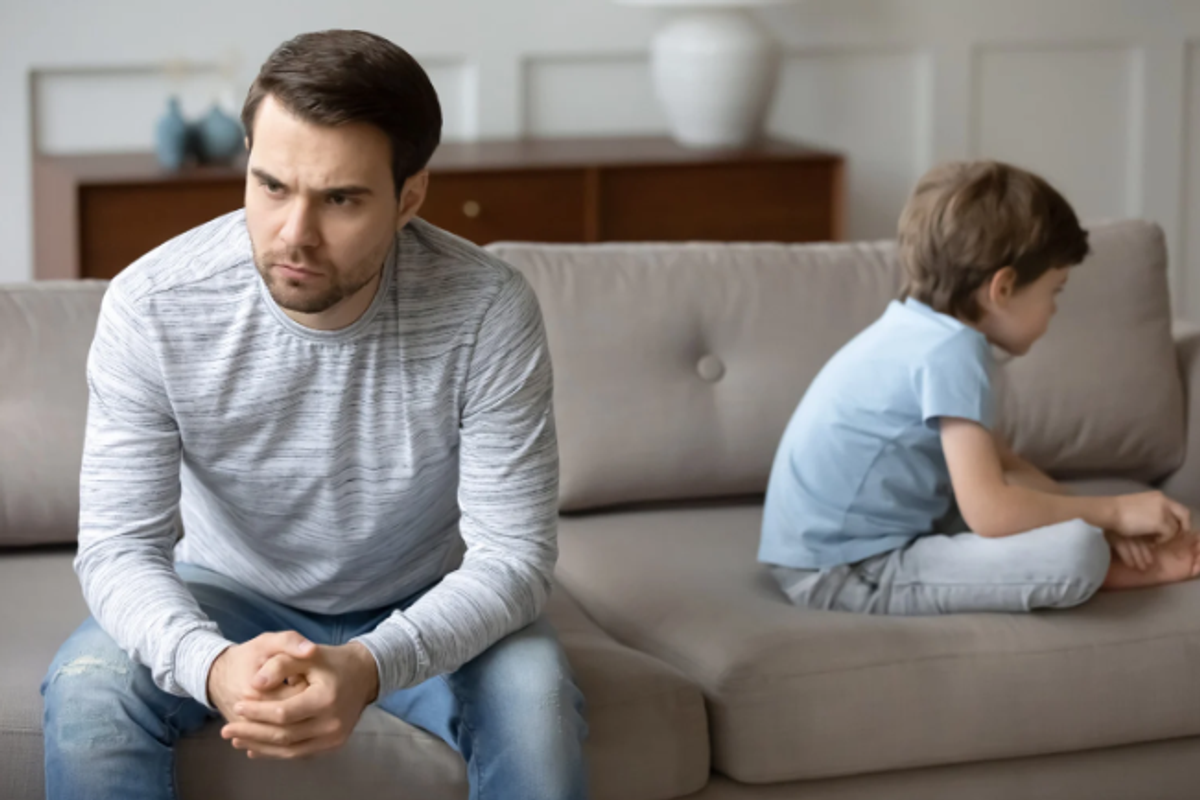Woman shares why an angry parent’s energy should never poison the mood of your home
"Parents' emotions shouldn't be internalized by children."

An angry dad sits on the couch.
It’s common in many households for one parent to get angry, and the bad vibe spreads to everyone, sucking the joy out of the home. The kids run off to play in their rooms, and the spouse goes to their bedroom and picks up a book. Nobody wants to confront the angry parent and get a mouthful until they've completely calmed down.
However, Muffin of the Sister.Sister.Sister TikTok page says that her home was an anomaly because she never felt uncomfortable when her father was angry.
“My sisters and I were talking about when my dad gets upset, none of us cares," Muffin says in a video. "Not care in the sense that we don't care that he's upset, but none of us care in the sense that my dad can come in a room and be mad about something or yell about something, and it does not change the energy of the room."
@sister.sister.sister what a concept!!! #therapy #therapytiktok #therapytok
“Because parents' emotions should not be internalized by children, a parent being mad or upset should not change the entire energy of the room in the house," Muffin continued. "A parent being upset should not force everyone else to walk on eggshells and tiptoe around their emotions. That is so unhealthy.”
Parents' emotions can control the mood in a home
Muffin’s admission shocked many in the comments who had grown up internalizing their parents’ emotions.
"I. CANNOT. EVEN. IMAGINE. Our entire household was held responsible for my mother's mood," Megan wrote. "I can’t even conceptualize this enough to be jealous of it, but I know I should be," Leann added. "Getting out of my parents' house was the best thing for my stress and anxiety. My father held us all emotionally hostage my whole life," Ashton wrote.

Why do children internalize their parents' emotions?
“Humans are wired with mirror neurons and highly sensitive nervous systems," Kan Yan, founder of Parents Reimagined, told Upworthy. "We pick up on tone of voice, facial expression, body posture, and even micro-shifts in breathing. That’s why one person’s anxiety can ripple through a household in seconds. It’s also why calm can be equally contagious. Neuroscience calls this ‘co-regulation’—our nervous systems sync with one another, especially in close relationships like families. In healthy systems, parents act as emotional anchors. In less healthy ones, kids end up tiptoeing around volatility, absorbing stress that isn’t theirs.”
Jerred England, owner of England Therapy, adds that it's nearly impossible to ignore your parents’ emotions. “We’re innately social beings, so emotions being contagious is something we should expect,” England told Upworthy. “So, it’s very normal to begin to empathize and sympathize emotionally. People who can’t do that are outliers in our society, like those with borderline and sociopathic personality disorders."

It's possible to live in a home where parents’ emotions aren’t threatening, but it takes effort from their parents. “In those homes, a parent might raise their voice, but then repair, explain, or stay connected," Yan said. "Over time, this teaches children that emotions are just energy moving through the body, not danger."
Ultimately, when you live with other people, you’re going to have to deal with their emotions. If there is a healthy dynamic in the home, people will feel free to express themselves without holding the whole home captive. The key for parents is to be emotional without bringing chaos, and to stay connected to their family to reduce any anxiety their emotions may cause.



 A
A 

 Each of those arms has its own brain?
Each of those arms has its own brain?
 A man sleeps peacefully.
A man sleeps peacefully.  Woman snuggled in bed.
Woman snuggled in bed.
 The size of Japan compared to the United States.Image via Wikimedia
The size of Japan compared to the United States.Image via Wikimedia